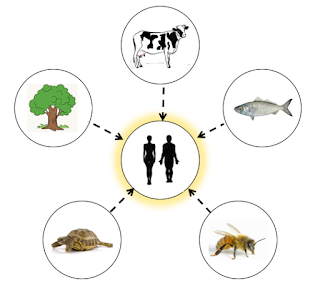"Humans" are destroying Earth... Really?
By Rodrigo Cáceres
Yesterday I discovered a comic strip that left me a bit perplex... (You can take a look at it here).
In the image one can read a scientist portraying his categorical message " We are destroying Earth" and to his right a government officer who asks "Could you kindly rephrase that in equivocal, inaccurate, vague, self-serving and roundabout terms that we can all understand?".
Contrary to what you might think, I would like to prove you that the formulation "We are destroying Earth" is already a quite vague and imprecise way of framing environmental issues.
For those who are familiar with environmental news and scientific papers on environmental issues (if not, you are welcome to take a look at mainstream environmental journalism), you might have noticed that almost all the time, the responsibility for environmental issues is attributed to a generic and indeterminate subject: "Humans", "Man", "Humanity" or simply "We".
In linguistics, we call that a mass noun (Stibbe, 2015). A mass noun is an abstract concept that generalizes and homogenizes an ensemble of entities. The purpose of a mass noun is to be able to incorporate many and diverse elements into a single word, so that one can convey all those elements at once. For example, when one says "nature", one conveys birds, flowers, turtles, the sun, the sea, and so on, all at once. Thus, mass nouns' purpose is to encompass rather than to examine. In this way, with mass nouns we can make extremely general statements such as "humans depend on nature", which are truthful, but they tell us nothing about which specific elements of nature we depend on and to what extent. Thus, they are simply not made to identify, their purpose is to represent the general instead of the particular.
Within environmental discourse, when these mass nouns like "Humans" or "We" are utilized, they do not provide any form of identification of real social actors, whether they are specific socioeconomic categories or specific corporations, for example.
Within environmental discourse, when these mass nouns like "Humans" or "We" are utilized, they do not provide any form of identification of real social actors, whether they are specific socioeconomic categories or specific corporations, for example.
Also, these mass nouns conceal the existence of institutional mechanisms and power disparities which are key factors causing environmental issues, such as capitalism, the international financial system and multinationals' lobby campaigns in politics and legislation.
Moreover, these mass nouns conceal important dimensions of environmental (in)justice, for example the fact that environmental problems are caused mainly by modern industrialized cultures, and not by indigenous cultures that live more or less in harmony with their natural milieu.
Mary Schleppegrell conducted a study where she noticed that these generic and indeterminate subjects "We" or "Humans" lead individuals towards representing solutions in terms of a "shared responsibility model". In this model, all people are judged equally responsible for environmental problems. Moreover, she found that this shared responsibility model leads to thinking about solutions mostly at an individual level.
Subsequently, she argues that these individual solutions are mostly framed in a way that defines individuals as consumer-subjects instead of individuals as political-subjects. The consequence? Solutions such as recycling, buying organic products and abandoning meat consumption are manifestly more encouraged than political actions, such as joining organizations for nature protection, protesting, suing those responsible for environmental damage, participate in community-local decisions, among others.
As a conclusion, we were able to point out that media and scientific language are most likely an active force that orients individual reactions towards environmental issues. This orientation goes in the direction of a "shared responsibility model" where we are all - as consumers - equally responsible for environmental issues.
Naturally, the recommendation that we can all take from this (scientists as well as journalists and teachers) is that we should avoid these generic and indeterminate formulations. This implies, of course, having the will to name those responsible for environmental problems: whether they be human, corporate or institutional.
References
Schleppegrell, M. J. (1997). Agency in environmental education. Linguistics and Education, 9(1), 49-67.
Stibbe, A. (2015). Ecolinguistics: Language, ecology and the stories we live by. Routledge.





Comments
Post a Comment